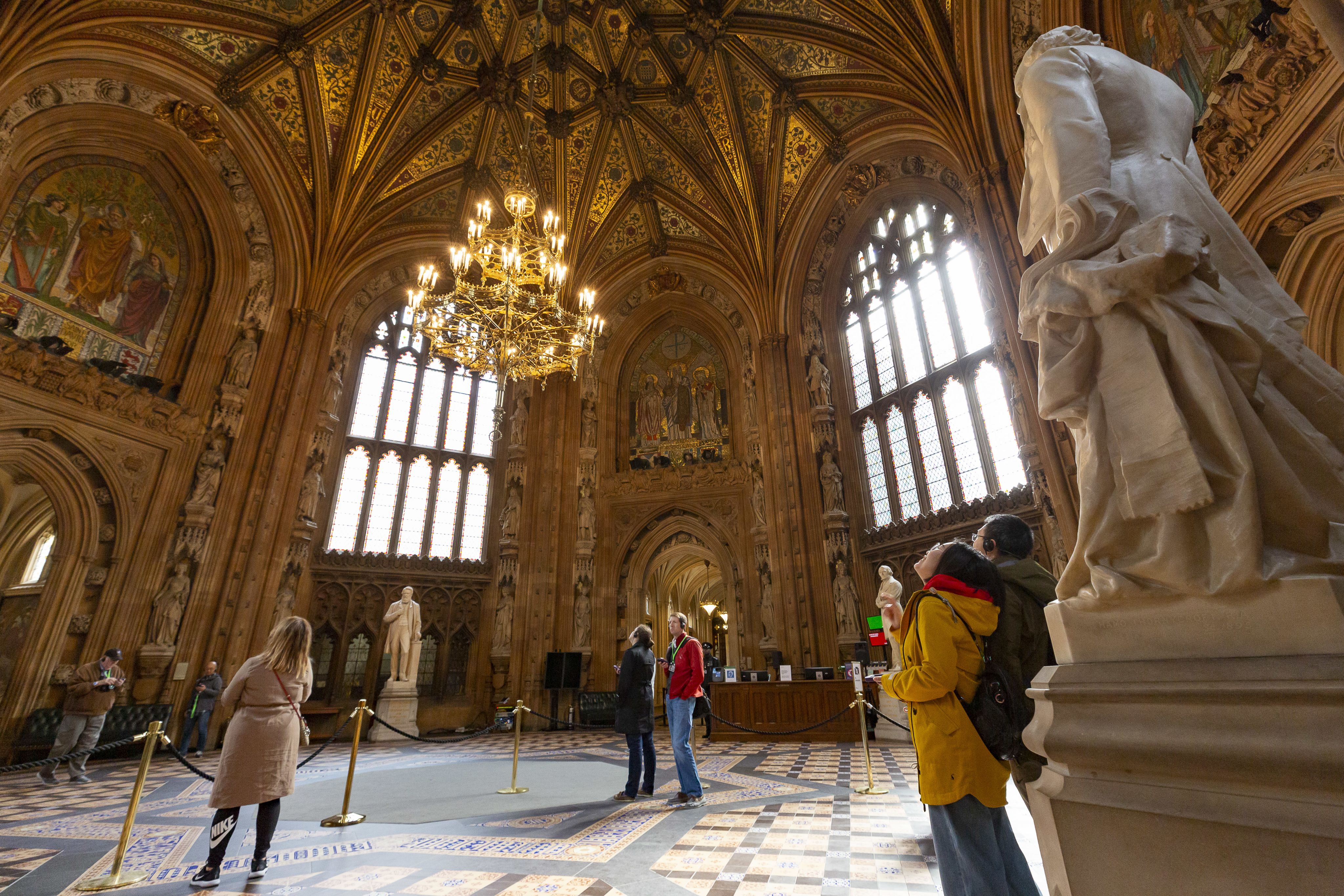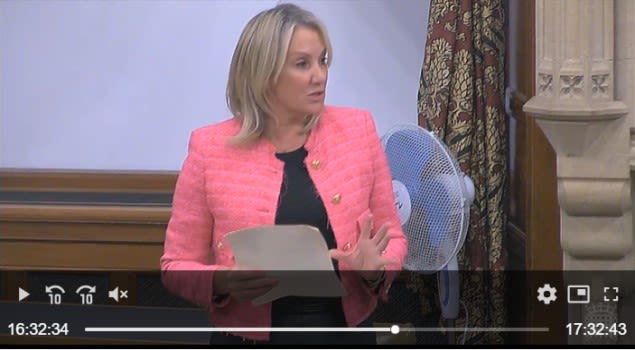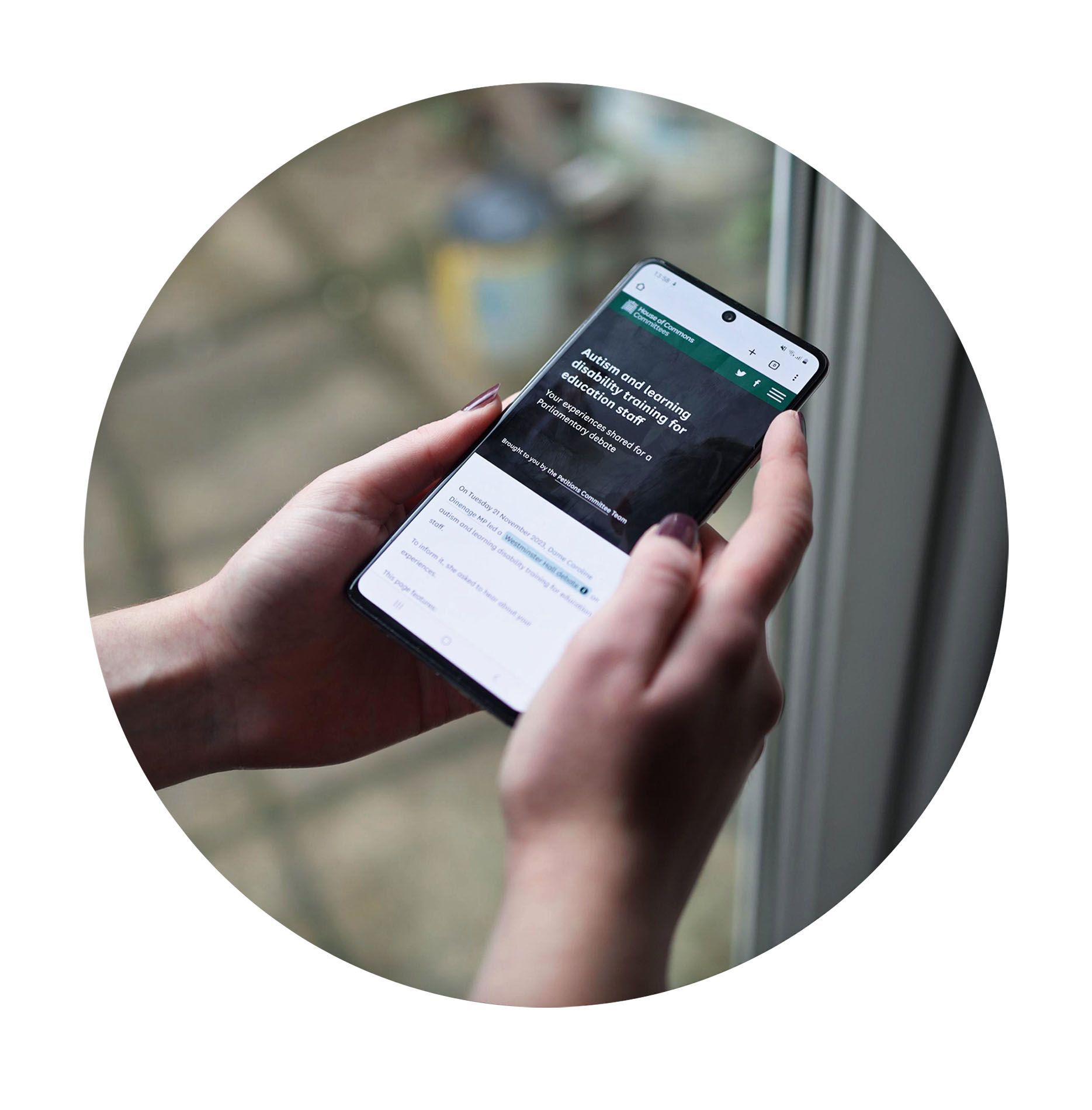Autism and learning disability training for education staff
Your experiences shared for a Parliamentary debate

On Tuesday 21 November 2023, Dame Caroline Dinenage MP led a Westminster Hall debate on autism and learning disability training for education staff.
To inform it, she asked to hear about your experiences.
This page features:
- A thank you message from the MP
- Video clips of the debate
- Links to watch or read it
- A summary of the Government's response
- A Westminster Hall debate explainer
- Links to relevant resources, activities and support.
During the debate, she thanked those who signed the petitions on the topic and responded to the survey:
"I thank everyone who took time to sign the petitions, which clearly relate to issues that are of huge concern to people across the country.
"I also thank the nearly 3,000 people who contributed to the Commons engagement team survey and gave their views on more education staff training.
"Some of the stories which they have shared with us have been exceptionally troubling. I am grateful for the time and effort that has gone into communicating those stories, which in some cases involved sharing very painful experiences."

Watch or read the debate:
Contributors' stories read out:
Read the full transcript:
Watch the full debate:
What are Westminster Hall debates?
Jump to our full explainer ⬇️
Feedback:
If you took part in this activity, please answer three quick questions about how it worked for you:
The Government's response

The Minister for Children, Families and Wellbeing, David Johnston MP, responded to the debate on behalf of the Government. He addressed the Government's current policy agenda and future ambitions related to the debate topic.
Watch or read his full speech for details where he covers a range of topics including:
- The new mandatory national professional qualification for special educational needs co-ordinators (SENCOs), which will begin teaching in autumn 2024
- A £2.6 billion special educational needs and alternative provisions reform programme
- Funding for 7,000 early years staff to gain an accredited level 3 SENCO qualification
- Reviews of the early career framework and initial teacher training framework, which will conclude at the end of 2023
- The cross-Government Autism strategy
- The Government’s national strategy for autistic children, young people and adults
- £4.2 million allocated to services for autistic children and young people, including assessment services through the autism in school programme.
- The Universal SEND Services programme which provides special educational needs and disabilities training for the school and college workforce.
Your feedback
"As someone who has dedicated her life to making education inclusive, I am pleased to see that Parliament are taking steps towards inclusion for people like myself who are neurodivergent.
"I see the work of Parliament having a huge relevance to our lives. The experience of being involved in this debate has given me hope.
"I would contribute my views again if I thought they were relevant, and I would encourage others to get involved and give their opinions too."
"I have explained to friends and family the whole process from petition through to final feedback. Some were not aware of the petitions process.
"Whilst the debate did not result in law or policy change, this is a significant starting point and, as I explained to our granddaughter, when she gets older society will hopefully be a more autistic friendly and understanding place, because of little actions like this debate.
"Nothing will ever change unless there is a desire and motivation to change it. This is one way of influencing and motivating change.
"Based on this experience, I would contribute my views again to a parliamentary debate if it's an issue or topic which is important to me or one that I have experience or competence with.
"This is the first time I have done this, and I am impressed by the process and loop including opinions and feedback. It makes you feel very listened to."
"I came across the survey in multiple groups which I am in online. I shared the link for the questionnaire, so friends and family knew about the debate and hopefully completed the questionnaire too.
"I really enjoyed watching the debate online. This is a subject that’s very close to my heart, and I will continue to follow progress on it and be involved as much as I can be. From personal experience, I feel the struggle for autistic children could be made much easier if education staff had better training and awareness.
"I would absolutely contribute again to a parliamentary debate and encourage others to do so."
What are Westminster Hall debates?
Westminster Hall debates enable backbench MPs from any party to raise an issue, and receive a response from the government.
They do not involve a vote on a particular action or decision.
Instead, the aim is to:
- raise awareness of an issue, often as part of a wider campaign
- seek to influence government policy
- put the views of backbench MPs, opposition parties, and the government on record.
The setting
Westminster Hall debates happen in the Grand Committee Room — the second chamber of the House of Commons.
Here, MPs sit in a horseshoe shape. This can help to encourage a constructive atmosphere.
Chairing the debate
Westminster Hall debates are chaired by an MP. The role of the Chair is to:
- ensure debates keep to the time allocated
- call on MPs to speak
- make sure MPs follow the rules of debate.
To mark the start of the debate the Chair says:
"Order, order"
Opening the debate
The MP leading the debate makes the first speech.
They will generally:
- outline their views on the issue
- present examples
- in some cases, call on the government to take action.
Backbench speeches
After the opening speech, other backbench MPs take turns to speak in the debate.
The main opposition parties
For longer debates, the main opposition parties then have a chance to respond.
An MP from the third largest party generally goes first, and is followed by an MP from the official Opposition.
They outline their party’s position on the issue.
The government's response
The Chair then calls the Minister to respond to the debate on behalf of the government.
The Minister will generally:
- respond to concerns raised by MPs
- explain the government's position and policies
- share relevant plans or ambitions for the future.
Closing the debate
If there is enough time, the MP who opened the debate can make final comments.
The debate is then concluded.
Engaging with debates
There are a number of ways you can engage with Westminster Hall debates:
- You can contact your MP and ask them to attend a debate. Or you can ask them to lead their own debate on an issue you feel is important.
- For some debates, you may be asked to share your insights and experiences. This can help inform the MPs taking part in the debate. See the Chamber Engagement website for details.
- You can watch debates online or attend in person. Find out what's on by looking at the Parliamentary calendar.
Lisa, Ian and Charlotte helped inform previous debates on topics like the menopause and pensions advice:
For more on Westminster Hall debates, see How Parliament Works.
Parliamentary resources

House of Commons Library
Relevant research:
- Special Educational Needs: support in England (May 2023)
- Autism: Overview of policy and services (April 2023)
- The Special Educational Needs and Disabilities and Alternative Provision Improvement Plan (March 2023)
Relevant committee inquiries
- Public Accounts Committee: Support for children with special educational needs and disabilities (February 2020)
Support links

- NHS: Help for families of autistic people
- NHS: Advice about school if your child is autistic
- National Autistic Society: Education
- NHS: Getting support with learning disabilities
- Mencap: Learning disability advice and support.
Get involved

Free workshops
Our outreach team can visit you in your community, and deliver free workshops and presentations on how to take action and be heard.
EMPOWER! Workshop for adults with learning disabilities
Relevant learning resources
Learn about how UK Parliament works with six easy reads. These have been created for people with a learning disability.
This illustrated booklet contains stories of influential people who have impacted disability related UK laws and equal rights:
Disability History Month illustrated book
This set of videos and learning resources will support students’ thinking around disability legislation:
Your Story, Our History: Disability legislation
Visit Parliament
Other ways to get involved
Find out what's on in Parliament, start a petition, contact your MP and more.
Photo credit: UK Parliament / Jessica Taylor





